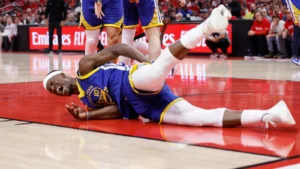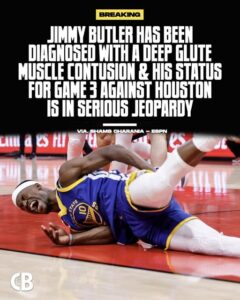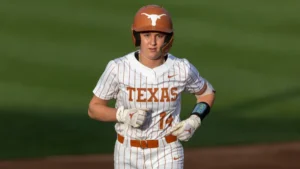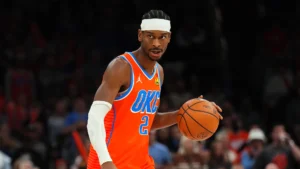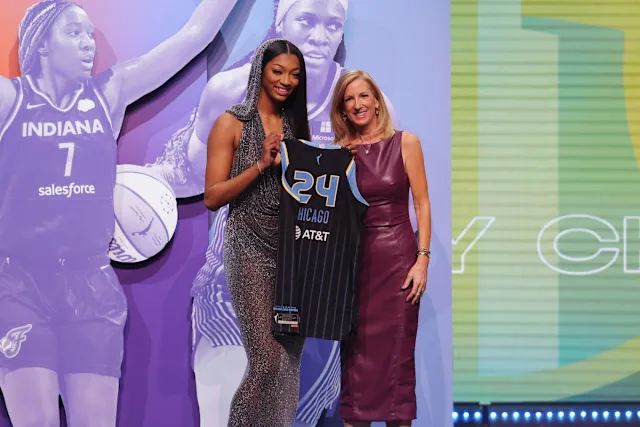
WNBA Commissioner Kathy Engelbert weighs in on the rivalry between Caitlin Clark and Angel Reese
The college basketball world has been buzzing with the intense rivalry between two of the most exciting and dominant players in recent years: Caitlin Clark of the University of Iowa and Angel Reese of Louisiana State University (LSU). Their performances on the court have captivated fans, but their rivalry has also been marked by controversy, particularly regarding the racial and gender dynamics at play. These two athletes have quickly become household names, not only for their skills but for their personalities, competitive spirit, and the way they’ve managed the pressure that comes with such attention.
Caitlin Clark, a sharpshooting guard for Iowa, made headlines for her incredible range and ability to dominate games. Angel Reese, a versatile forward for LSU, has been equally impressive with her athleticism and trash-talking demeanor, which has been central to her on-court persona. Their rivalry came to a head during the 2023 NCAA Women’s Basketball National Championship, where LSU defeated Iowa, with Reese at the center of much of the post-game controversy. Reese’s taunting gestures, particularly her “you can’t see me” gesture aimed at Clark, sparked a media firestorm, reigniting debates over race, sportsmanship, and the behavior of women in sports.
Amid this growing tension, WNBA Commissioner Cathy Engelbert weighed in on the rivalry, offering her perspective on the dynamics between the two players and what their interactions mean for women’s sports. While her comments were intended to shed light on the importance of rivalries in driving the popularity of women’s basketball, they inadvertently highlighted deeper issues surrounding race, identity, and the way women athletes are perceived and treated in public spaces.
Kathy Engelbert’s Remarks: The Magic vs. Bird Comparison
In an interview on CNBC’s Power Lunch in September 2024, Engelbert compared the Clark-Reese rivalry to the legendary rivalry between NBA greats Magic Johnson and Larry Bird. Johnson, who is Black, and Bird, who is white, played for the Los Angeles Lakers and Boston Celtics, respectively, in one of the most iconic rivalries in professional sports. Engelbert suggested that the Clark-Reese rivalry could serve as a similar catalyst for increased viewership and attention in women’s sports, due to the stark contrast in their backgrounds—one being a white player (Clark) and the other a Black player (Reese).
While Engelbert’s point was that the racial differences between the two could serve to deepen the narrative and intrigue surrounding their rivalry, the comment quickly sparked a backlash. Critics took issue with the comparison, arguing that it oversimplified the complexities of the rivalry and ignored the underlying racial dynamics that were at play. In particular, the comparison to Magic and Bird, who were both beloved and lauded for their sportsmanship, seemed to dismiss the ways in which Reese and Clark’s rivalry was compounded by race and gender.
Many felt that Engelbert’s comment didn’t adequately address the negative and often harmful discourse surrounding Reese’s actions, which included racial and sexist taunts that have come from fans and media alike. For many, the rivalry between Clark and Reese wasn’t just about basketball, but about the treatment of women athletes, particularly Black women in the public eye.
The Backlash: A Missed Opportunity for Dialogue
The backlash was swift and intense. Not only did fans and commentators express frustration with Engelbert’s remarks, but prominent players in the WNBA also voiced their concerns. Breanna Stewart, a WNBA superstar and 2023 MVP, took to social media to express her disappointment, emphasizing the responsibility of league leadership to protect players from harmful rhetoric and hate. Stewart, who is known for her outspoken advocacy on issues of race, gender, and social justice, argued that the comparison to Magic and Bird missed an important opportunity to address the very real and hurtful abuse that Reese and Clark had endured due to their respective racial identities.
The WNBA Players Association (WNBA PA), which represents the players in the league, also issued a statement condemning Engelbert’s comments. Executive Director Terri Jackson called on the league to take stronger measures to address the systemic racism and online hate that had been targeted at both Clark and Reese. Jackson’s statement reflected the growing frustration among athletes who felt that the WNBA, as the governing body of women’s professional basketball, had an obligation to protect its players from not only physical harm on the court but also the emotional and psychological toll of online harassment and racist abuse.
In response to the mounting criticism, Commissioner Engelbert issued an apology, acknowledging that her comparison to Magic and Bird was poorly timed and insensitive. She expressed regret for the way her comments had been interpreted, especially considering the racial dynamics at play in the rivalry. Engelbert emphasized that the WNBA, like all professional sports leagues, stands firmly against racism and hate and that the league is committed to fostering an inclusive environment where all players, regardless of race or background, feel respected and valued.
Her apology, however, did little to quell the controversy. Critics noted that while Engelbert’s words were well-intentioned, they reflected a deeper issue within the league—one of a lack of proactive action in addressing the intersection of race, gender, and the treatment of women athletes in the media. Engelbert’s comments, though well-meaning, underscored the broader cultural divide in the sports world, where the experiences of Black women athletes are often marginalized or misunderstood.
In the aftermath of the apology, many called for more robust measures from the WNBA, including stronger partnerships with advocacy groups that work to combat racism and harassment in sports, as well as a more proactive stance on educating fans about the impact of racial and gender-based discrimination.
The rise of social media has played a pivotal role in shaping the Clark-Reese rivalry. While the internet has provided fans with unprecedented access to their favorite players, it has also become a breeding ground for toxic behavior. Fans on both sides have used social media platforms to express their allegiance, but too often, this loyalty devolves into abusive rhetoric aimed at players. Reese, in particular, has been the target of racially charged comments, including threats of violence. Clark, too, has been caught in the crossfire, with her name sometimes used to fuel arguments and online hostility.
Both players have spoken out about their experiences with online abuse. Reese, who has been more vocal about her experiences, highlighted the emotional toll of dealing with racist and sexist attacks. In interviews, she explained how these incidents have affected her both personally and professionally, but also how they’ve motivated her to continue to perform at the highest level. Reese has expressed her desire for the sports world to take a stronger stand against hate and to ensure that women athletes, especially women of color, are protected from such attacks.
Clark, while less vocal than Reese about the direct impact of the abuse she’s faced, has nonetheless addressed the broader implications of online hate. She has called for a more responsible and respectful approach to fan engagement, advocating for a culture that values players as human beings first and athletes second.
Despite the tensions surrounding their rivalry, both Clark and Reese have expressed a desire to eventually play together in the WNBA. In interviews, Reese has openly stated that she would love to be teammates with Clark, emphasizing that competitive rivalry should not translate into personal animosity. This sentiment reflects a shared understanding between the two athletes that women in sports should support one another rather than be pitted against each other for the sake of entertainment or media narratives.
Reese and Clark’s potential future collaboration in the WNBA represents a shift toward a more inclusive and supportive culture within women’s basketball. Their ability to separate the competitiveness of their rivalry from their respect for one another as athletes could serve as a model for the broader sports community. As they both transition to professional careers, their relationship will likely continue to evolve, influencing the way women’s basketball is perceived and celebrated.
The controversy surrounding the Clark-Reese rivalry underscores the complex realities faced by women athletes, particularly women of color, in the spotlight. While men’s professional sports leagues like the NBA have made significant strides in addressing racial issues and advocating for players’ rights, the women’s sports world has often lagged behind in creating spaces where female athletes feel supported, valued, and protected. The WNBA, as the premier women’s basketball league, has an important opportunity to lead the way in ensuring that all players are treated with dignity and respect, both on and off the court.
Engelbert’s comments—though controversial—serve as a reminder of the importance of leadership in shaping the culture of women’s sports. The WNBA has made progress in promoting gender equity and providing female athletes with a platform to showcase their talents, but there is still much work to be done to combat the racial and gender-based discrimination that many players face.
In the coming years, the league must continue to engage in open conversations about race, inclusion, and the treatment of women athletes, ensuring that players like Caitlin Clark and Angel Reese are not only celebrated for their athleticism but also protected from the harmful forces that seek to undermine their achievements.
The rivalry between Caitlin Clark and Angel Reese has captivated the world, but it has also sparked important conversations about race, gender, and the treatment of women in sports. WNBA Commissioner Kathy Engelbert’s comments on the rivalry, while well-meaning, revealed the complexities of navigating these sensitive issues in the public eye. As the WNBA continues to grow and evolve, it must ensure that the voices of all its players are heard, respected, and protected.
The rivalry between Clark and Reese may one day be remembered as a pivotal moment in the history of women’s basketball—a rivalry that transcended the court and became a powerful symbol of both the challenges and opportunities facing female athletes. By continuing to push for a more inclusive, respectful, and supportive environment, the WNBA can ensure that the future of women’s sports is one where all players, regardless of their background or identity, can thrive.
